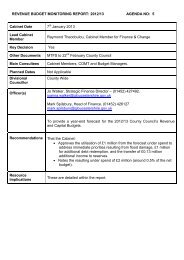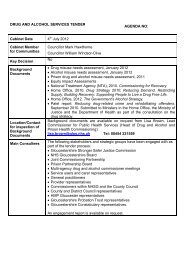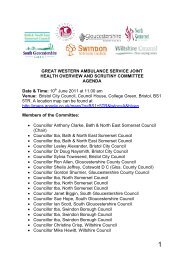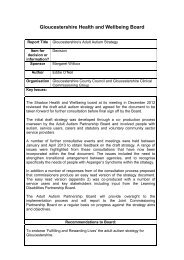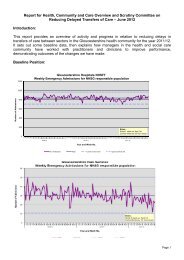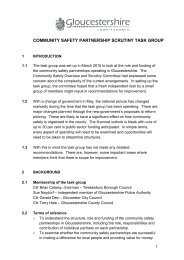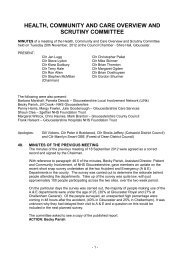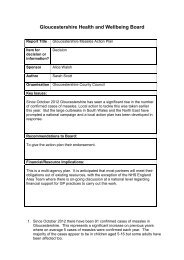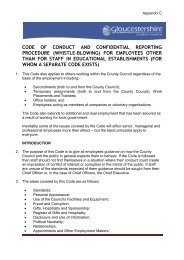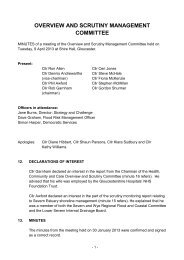Agenda item 4 - MTFS (Final) Cab 070213 , item 9. PDF 1 MB
Agenda item 4 - MTFS (Final) Cab 070213 , item 9. PDF 1 MB
Agenda item 4 - MTFS (Final) Cab 070213 , item 9. PDF 1 MB
Create successful ePaper yourself
Turn your PDF publications into a flip-book with our unique Google optimized e-Paper software.
Currently an estimated 38,000 older people are living on their own in the county. The number is<br />
projected to rise by about 1,000 a year between 2010 and 2020, and then by 1,300 in the longer<br />
term. Between two-thirds and three quarters of single pensioners will be aged 75+, and among<br />
these 70-80% are women.<br />
Dementia is also an increasingly common condition. In Gloucestershire, there are estimated to be<br />
8,395 people living with dementia. That number is expected to almost double over the next 20<br />
years to 15,151.<br />
As we do not anticipate new investment to meet the needs of our future residents, we have a duty<br />
to plan now in order to build communities who can respond to these changes. In addition to<br />
building capacity, we will need communities who adopt a positive and inclusive approach to people<br />
with disabilities and are not risk adverse. However, this will require a more responsive style of<br />
intervention from statutory services when such risks become unmanageable.<br />
Gloucestershire also has considerable additional pressures in the area of learning disabilities. We<br />
are the third highest region in the country for claims of ‘ordinary residence’. This is fuelled by a<br />
considerable number of placements by other counties into our jurisdiction with resulting claims that<br />
these service users have now become the financial responsibility of Gloucestershire. In addition<br />
the life expectancy for people with learning disabilities continues to add to expected cost<br />
pressures as their care in most cases becomes more expensive based on such things as genetic<br />
dispositions to early onset dementia. Similarly at the young adult end of the spectrum the cases<br />
received from children’s services into adult services demonstrate ever higher levels of need as<br />
heroic medical efforts with premature births lead to people having more profound and multiple<br />
disabilities than seen before and requiring higher levels of costly specialist provision.<br />
Meeting the Challenge 2012/13<br />
We have 14 projects targeted at living within our means and adjusting to meeting demand<br />
differently. Most of these are designed around the implementation of national policy and good<br />
practice – developing a model of reablement, working in multidisciplinary teams, commissioning<br />
differently, listening to our service users and improving the customer journey. Others have<br />
addressed processes – improved recovery of debt.<br />
Achievements in year one of Meeting the Challenge include reducing long term dependency<br />
through improved targeting of our reablement service and developing a partnership approach to<br />
tackling cost pressures from within the independent sector..<br />
In the area of learning disabilities shifting provision to lighter touch front door services such as<br />
Drop In centres has been supplemented with a new focus on employment for people with<br />
disabilities thus increasing independence and reducing costs.<br />
Looking Forward<br />
The proposed budget for 2013/14 requires us to reduce our costs by £<strong>9.</strong>27m in order to live within<br />
our means.<br />
We intend to achieve financial balance in adult services by:<br />
• fully implementing reablement<br />
• reshaping our assessment and care management model through integration and the<br />
development of multidisciplinary teams<br />
• supporting more people to live independently in the community<br />
30



